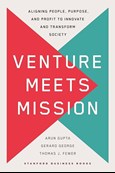- Innovation
Gov’t Mission Meets Business Venture
An impassioned call to build a mission-driven entrepreneurial ecosystem to address societal challenges
Sadly, this was no surprise. Governments the world over fail to connect effectively with entrepreneurial businesses and too often initiatives which governments have the resources to scale up are ignored, mired in bureaucracy, or stymied by overzealous regulation. In the case of the PPE for the NHS, the government opted for recognized brands such as Burberry, which struggled to cope, and eventually outsourced the process to management consultants at great additional cost.
Given the current perilous state of the world—beset with climate change, cyber threats, food insecurity, potential pandemics, disruptive AI, and more—it is vital that governments learn to collaborate effectively with industry to find solutions. Only by releasing the innovative entrepreneurial spirit of business people, allied to a mission shared with government, can the many intractable problems we face be addressed.
Unfortunately, the public debate often counters this need, breeding suspicion of ‘capitalist’ entrepreneurs as being the cause of income inequality and blaming governments for constant mission failure. Or by presenting a too gloomy and so hopeless picture when there are reasons to be optimistic. Global poverty must be tackled yet there are more than a billion fewer people living below the International Poverty Line today than in 1990. Climate is of course critical but great strides have been made over the past decade. AI presents problems but there is no evidence these may be existential.

“Transforming society with the optimism of entrepreneurship and the scale of government,” is the message underling Venture Meets Mission: Aligning People, Purpose, and Profit to Innovate and Transform Society, a new book from Arun Gupta, Gerard George, and Thomas Fewer—practicing entrepreneurs and academics at Stanford University and Georgetown University’s McDonough School of Business. The authors draw on their leadership experience with Silicon Valley innovation, venture capital, and working with federal government to help business better engage with government and show government officials and policymakers how they can harness private sector entrepreneurship and innovation, and what impact this can have.
Trust is too often the missing ingredient. Business people distrust governments with their tortuous regulations and procurement processes. Risk-averse government officials are non-plussed by the start-up mindset of business innovators. While scientists and academia have difficulties with both over funding and goals. And the public lacks trust due to false myths around the dichotomy between purpose and profit.
To solve societies problems these ecosystems must be brought into sync, say Gupta, George, and Fewer, so that with a renewed partnership the ideas and innovation of entrepreneurship can be scaled up with the resources and commitment of government. Venture Meets Mission came because the authors realized the “catalyst for change at scale” was missing and set out to help resolve some of the challenges inherent in venture/mission (business/government) arrangements, define a “venture meets mission” ecosystem, and consider the associated talent development and leadership aspects.
Based on interviews with key players in industry, government, and academia, and illustrated with a series of revealing cases, the book is itself essentially optimistic. It demonstrates how, despite being perceived as sluggish and bureaucratic, government involvement and funding has been behind many recent advances from Covid vaccines to green energy. The route to future success—and the potential rewards which are high include the strengthening of our democratic institutions—is largely one of resetting relationship to bring together “people seeking mission, the innovativeness of venture, and the scaling capacity of government.” We have the knowledge and tools to do this and, the authors believe, we are at a generational inflection point where now is the time it can be done. How to proceed is the advice they provide.
…………………………………………………………………………………………………………………………..
Since its founding in 1957, the McDonough School of Business has garnered global recognition for excellence in international business.
ARTICLES YOU MIGHT LIKE
VIEWPOINT
Cognitive neuroscientist, Lynda Shaw, explains how to understand and support intrapreneurs
DEVELOPING LEADERS QUARTERLY MAGAZINE AND WEEKLY BRIEFING EMAILS


































